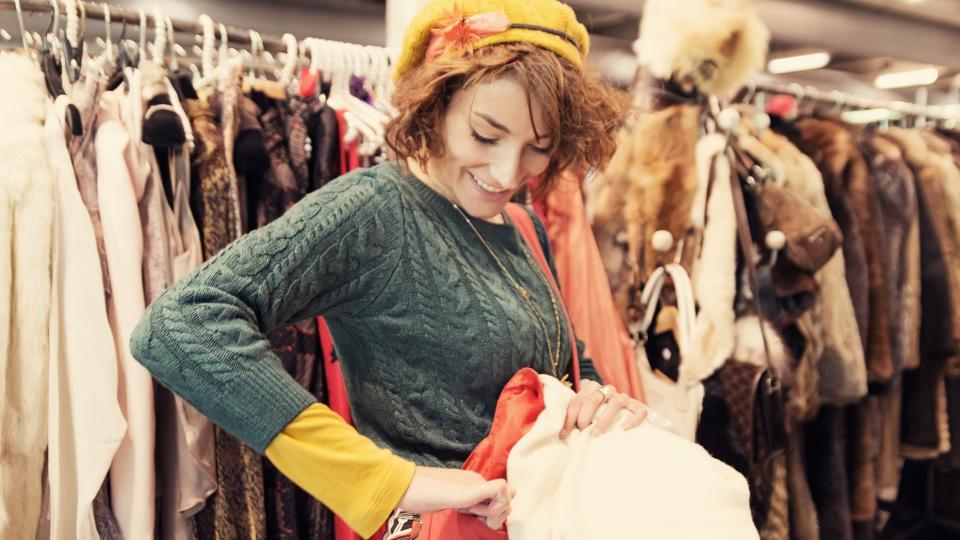9 Things To Avoid Buying at Thrift Stores

Thrift stores are an important part of the retail industry, providing a unique shopping experience for customers and a great way to recycle and reuse items. As consumers continue to stretch their dollars and change their spending patterns, the “recommerce” market is booming and expected to grow progressively over the next few years.
I’m a Shopping Expert: 9 Items I’d Never Put in My Grocery Cart
Next: Pocket an Extra $400 a Month With This Simple Hack
You can call them resale, consignment or not-for-profit shops, but there are currently more than 25,000 “thrift” stores in the United States, according to the Association of Resale Professionals. Thrift shops help save millions of pounds of clothing from landfill dumping annually, operate in aid of community development and are often associated with local charities.
There are big savings to be had at secondhand stores, but they may come with unexpected costs. Bargain buyers need to beware of these nine things you should never buy at the thrift shop.
Sponsored: The Results Are In: Is your bank one of the best of the year?
Stuffed Animals
Once-loved stuffed toys are popular sellers at thrift stores. However, these items may not be in the best condition and could potentially be hosts for fleas and bed bugs, drool and snot and odors, mold and other allergens. Washing these li’l plushies sometimes takes a lot out of them as well, causing them to get disfigured or destroyed.
Bike Helmets and Hats
Hats and helmets are not ideal buys at thrift stores unless they are like new. A used hat could potentially carry lice or other harmful infections and allergens. Same with helmets, which have the extra potential of not meeting required safety standards.
According to WebMD, “From bikes to horse riding, most helmets are made to hold up through only one crash. Or one drop on a hard surface. Once that happens, the foam inside squeezes and won’t protect you the same way, even if it looks fine.”
Skincare Products and Makeup
Used on hands and near your mouth, nose and eyes, makeup containers, brushes and skincare products are breeding places for all sorts of other people’s germs. If labels have fallen off makeup packaging, unknown ingredients and warnings may result in skin rashes and serious infections.
Mattresses and Pillows
Bedbugs can crawl into the tiniest seam or fabric crack and go a year without eating, per Terminix. Once you have them in your mattresses or bed and sofa pillows, they’re difficult to get out. New mattresses are extremely expensive, so if you’re trying to find a secondhand deal, check them out very closely and look for bugs, eggs and tiny black dots.
Pet Furniture
You’ll never know what previous pets were up to on secondhand pet beds, houses, crates, blankets and toys. Used pet beds and furniture can harbor bacteria such as parasites, fleas and other allergens that can be harmful to your pet’s health. To prevent stinky smells from overrunning your living space, treat them to something new and clean.
Vacuums
Vacuum cleaners get used often and don’t get cleaned properly by most owners. They tend to lose their suction quickly, too, which is probably the reason you are seeing them for sale in thrift stores. If you can’t take the vacuum for a test drive, this is one item that is probably better bought new.
Undergarments
Unless a thrift store has received a donation of new, unused underwear or swimsuits in sealed packages, it’s best to stay far away from buying these items — for obvious reasons.
Opened Puzzles
There are few things as frustrating as finding out you’re short a puzzle piece when you’re nearing the end. According to Cheapism, buying secondhand puzzles is a risky purchase for that very reason — you never know if a puzzle has missing pieces. Additionally, they are a surprisingly rich hotbed for bacteria and germs.
Dollar Tree Plus: 10 High-Quality Items To Buy Now
Infant Car Seats, Strollers and Baby Cribs
Everyone know babies are wonderful — and wonderfully expensive. Parents should take advantage of baby essentials at thrift or consignment stores as kids grow out of things every couple of months.
However, while gently worn clothes and furniture are reasonable secondhand purchases, stay away from well-used cribs, strollers and car seats that have outdated warranties, may not meet safety standards or have been previously recalled.
Whether you are a proponent of reducing waste, a trendy shopper looking for unique items or simply looking for value in these uncertain times, you can save an average of $1,760 per year by buying secondhand items, per CouponFollow’s “Top Cities to Thrift in 2022” report.
More From GOBankingRates
This Mistake Can Tank Your Credit Score 100 Points Overnight
If You Find a Rare 'Doubled Die' Penny, It Could Be Worth $1.14 Million
This article originally appeared on GOBankingRates.com: 9 Things To Avoid Buying at Thrift Stores
